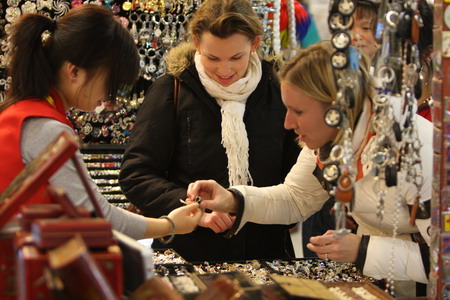Economy
Silk Market dismisses fake goods report
By Todd Balazovic and Li Jiabao (China Daily)
Updated: 2011-03-03 16:20
 |
Large Medium Small |
|
 |
|
Foreign tourists haggle for bargains at Beijing's Silk Market. [Photo / Provided to China Daily] |
The shopping center, which is popular with tour groups and foreigners living in the capital, was one of several recently identified by the US Trade Representative (USTR) in its Review of Notorious Markets.
However, a manager with Silk Market Company Ltd, who gave only her surname as Hu, told METRO that the report was of little importance.
"I've not heard of (the US report)," she said, "and I don't care about what any other media is saying about (the Silk Market). We're doing our best to fight against fake goods."
The only reason fake goods are on sale is because of the demand created by shoppers looking for bargains, she said, adding that more than 80 percent of Silk Market patrons are tourists.
"The guilt for fake goods is shared between the buyer and the seller," she added.
Officials at the USTR named more than 30 websites and physical markets worldwide as the worst offenders against intellectual property rights laws. Ten of them were in China.
"The list highlights with concern some of the most prominent examples of notorious markets," the report said, before going on to describe the Silk Market as a "particularly prominent" example of "counterfeiting of consumer and industrial products".
Hailong PC Mall, the largest computer market in the capital's rising "Silicon Valley", Zhongguangcun, was also accused in the report of selling computers containing unlicensed software. Others listed included Baidu and Taobao.
Hu said she recognizes that fake goods have been a problem in the past, but insisted her company is making every effort to combat IPR infringements.
| ||||
"Traders used to have only a very basic understanding of IPR laws," she said, adding that several training sessions have helped educate shopkeepers on the law.
Silk Market bosses have also been working with Chaoyang district officials to help legitimate traders establish their own trademarks and brands, she said.
As efforts are being made to reduce the number of counterfeit products, the capital has seen a huge increase in cases relating to IPR infringements last year.
In 2010, the courts tried almost 9,000 cases, a 42-percent increase on 2009, according to data from Beijing Higher Court.
"China (on a whole) is going to great lengths to eliminate IPR infringements," said Aaron Hurvitz, of the foreign counsel for Kangxin Partners, a Beijing law firm specializing in IPR. "Through various sponsored education seminars and awareness campaigns, the level of knowledge and understanding of IPR continues to increase."
The USTR report is not the first time the Silk Market has come under fire for selling fake goods. During a citywide crackdown in October 2009, authorities found copies of such brands as Gucci, Coach and Adidas ready available at several stalls.
The raid led to the arrest of the mall's then-manager Wang Zili, who was charged with allowing the sale of fake goods and taking bribes.
English teacher Daniel Jocelyn, who has lived in Beijing for three years, said in May last year he spent an hour bargaining a vendor down from 2,000 yuan to 250 yuan for a pair of fake Bally shoes.
"The starting prices are ridiculously high and it was hard to tell the shoes were cheaply made," said the Briton. "For about 100 yuan more, I could have easily bought a real pair somewhere else."
| 分享按钮 |



